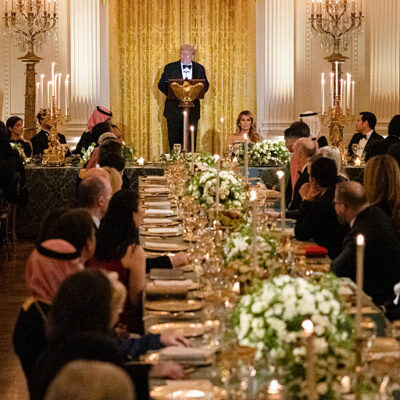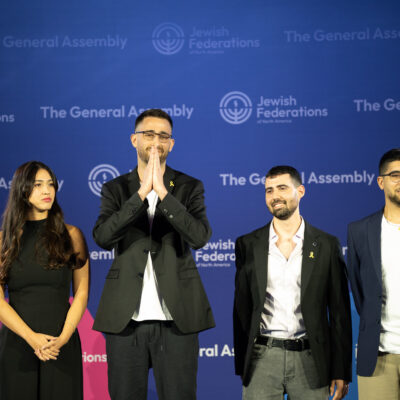Your Daily Phil: New report on the adoption of IHRA’s definition of antisemitism + Kansas City’s Jewish community
Good Tuesday morning!
Search “IHRA” on Twitter, and you may see a vociferous debate over a working definition of antisemitism published in 2016 by the International Holocaust Remembrance Alliance. In certain online forums, the 500-word definition has become a lightning rod for conversations about antisemitism, criticism of Israel and where they overlap.
But a new report hopes to show that, to quote a modern adage, Twitter is not real life. The report, published Tuesday and obtained in advance by eJewishPhilanthropy, found that 865 entities worldwide have adopted the definition. Last year, 200 entities adopted it, including 92 in North America.
The report was compiled by the Combat Antisemitism Movement, a coalition of groups founded in 2019, and Tel Aviv University’s Kantor Center, which studies European Jews. It found that the definition has been adopted by 37 countries, 320 smaller governmental bodies, 314 educational institutions and 194 other entities — from corporations like the Mercedes-Benz Group to European soccer teams to an evangelical broadcasters’ organization.
The debate over the IHRA document centers on its 11 examples of antisemitism. Six concern speech about Israel, and critics say some of them — such as one that says it’s antisemitic to call Israel a “racist endeavor” — could chill legitimate criticism of Israel. A 2019 executive order by President Donald Trump instructed government officials to consider the IHRA definition when evaluating allegations of campus antisemitism.
The report’s authors hope to show that this debate has not impeded the definition from becoming the world’s go-to document in defining hatred of Jews. “This is the mainstream consensus and those who oppose it, I think, are outside that mainstream consensus,” Arthur Maserjian, director of strategic content and international affairs for the Combat Antisemitism Movement, told eJP, calling it “the global standard for identifying and combating antisemitism.”
Maserjian believes the definition’s examples of speech regarding Israel proved their value during the wave of antisemitic attacks that accompanied last May’s conflict between Israel and Hamas in Gaza, when “local Jewish communities across North America and Europe were quite literally attacked in the streets by anti-Israel activists.”
Two other antisemitism definitions published last year give a wider berth to criticism of Israel. David Schraub, an assistant professor at Lewis & Clark Law School and a co-author of an alternative definition backed by leaders of J Street and the New Israel Fund, called The Nexus Document, appreciates its emphasis on context. But if organizations are adopting the IHRA definition to signal that they oppose Jew-hatred, he said, “I don’t have a problem with that, because IHRA is perfectly fine for basic, low-stakes work. When you’re starting to think in terms of governmental agencies, or… academic debates or discourse, then I think there’s good cause to want to be a little more discerning.”
The next step, said the report’s authors, is for more countries to adopt the IHRA definition and for those who have adopted it to implement it as an educational tool. “The practical use should be much wider,” Dina Porat, chief historian of Yad Vashem, the Israeli Holocaust museum, told eJP, including “as supporting evidence in courts [and] as guidance to police [officers] who get complaints.”
COUNTING JEWS
Survey shines a spotlight on Kansas City’s small, growing but aging Jewish community

Mark Shaiken/Getty Images
National Jewish population studies tend to receive lots of notice. But while most American Jewish organizational attention is lavished on large communities, an in-depth, 136-page study, released Tuesday, shines a spotlight on the challenges and bright spots of the Kansas City area’s smaller Jewish population. What the survey found is a small, growing but aging community that, in many senses, resembles American Jews’ national profile but departs in key ways, reports eJewishPhilanthropy’s Ben Sales.
Growing old: Since its last communal study, Kansas City’s Jewish population has grown more than 15%, from around 19,000 Jews in 1985 to about 22,000 now. But the median age of Jews in Kansas City is 60, far higher than the national Jewish median of 49 or the overall national median of 46. And while children make up roughly a quarter of the national Jewish community, they make up just a sixth of Kansas City’s.
Attached to Israel: Levels of attachment to Israel were much higher among Kansas City Jews than among American Jews as a whole. While 58% of American Jews told Pew in 2020 that they were attached to Israel, the number jumped to 67% in the Kansas City survey. And 60% of Kansas City Jews have been to Israel at least once. Helene Lotman, CEO of The Jewish Federation of Greater Kansas City, said the difference could be due in part to the area’s large share of older Jewish adults, who have had more opportunity to travel to Israel and who, nationally, show higher levels of support for and attachment to the Jewish state.
Drawing people in: Lotman’s focus is on engaging young people, particularly intermarried families. But while she’d like to grow the number of Jews in her area, Lotman said being a small community isn’t a bad thing. “I feel comfortable because I see people come here, and when people come here they enjoy being here,” she said. “It’s not like they’re coming and leaving.”
OPPOSING OPINION
Conservative Judaism does not need a ‘new narrative’ about intermarriage

Shutterstock
“A recent article in eJP announced the formulation of ‘Conservative Judaism’s New Narrative about Intermarriage.’ To justify the new approach, the article offers anecdotes about a handful of people and some sweeping assertions of dubious accuracy. Deriding the notion that intermarriage is in any way a ‘threat’ to Jewish life, the article dismisses the ‘old narrative’ equating intermarriage ‘with loss to the Jewish people,’ a faulty premise that ‘did not have the benefit of new research’” writes Jack Wertheimer, professor of American Jewish history at the Jewish Theological Seminary, in an opinion piece for eJewishPhilanthropy.
Vast chasm of separation: “New research shows nothing of the sort. To begin with the notion that intermarriage is benign, numerous studies offer evidence of a vast chasm separating intermarried families from inmarried ones on all measures of Jewish identification and behavior. Intermarried families are far less likely to observe Jewish religious rituals, identify with the Jewish people and Jewish communities, have Jewish friends, give to Jewish causes, care about Israel and feel it important that their own descendants are Jewish. Moreover, according to the most recent national survey of American Jews — Pew’s “Jewish Americans in 2020” — some 2.8 million people of Jewish background, meaning of Jewish ancestry, no longer consider themselves Jewish and 900,000 children raised by a parent of Jewish background are not being raised as Jews in any way — overwhelmingly due to intermarriage. If these staggering numbers don’t represent a loss to the population of 6.5 to 7.5 million American Jews, what does?”
UNSUNG HEROES
Shine Theory and Jewish organizations

Luis Alvarez/Getty Images
“One of my favorite stories from the Obama era was that of his female aides, who took to amplifying each other in important meetings, embracing Shine Theory — the idea that when women lift each other up, it raises all boats. I first learned the story from a then-colleague at the Religious Action Center of Reform Judaism, where I was blessed to work for nearly eight years. We began to do what the Obama aides taught by their example — lift up each other’s contributions in meetings, echo the good ideas of our female colleagues and call out and applaud the success of other women,” writes Shira M. Zemel, co-director of 73Forward: National Council of Jewish Women’s abortion access campaign, in an opinion piece for eJewishPhilanthropy.
Shine Theory and Purim: “As we head into this week’s celebration of Purim, I’ve been thinking a lot about this story and about the concept of Shine Theory. I’m inspired by Queen Esther, who spoke truth to the patriarchy. I want the Jewish world to stop and take a moment for a deep, collective ‘shine,’ and acknowledge the unsung heroes doing the most critical work at so many of our large Jewish institutions — women in mid-level leadership roles.”
The center is key: “When mid-level management is excellent, an organization can thrive and do exceptional work. I’d go so far as to say that the power and success of any organization comes from its center — from the leaders who oversee its day-to-day operations and supervise the staff doing critical work in the trenches. These are the managers and leaders who are tasked with executing the organization’s priorities, and they’re the ones delivering results… The center is where leaders work to lift red tape, cut through bureaucracy, train the next generation to lead and actually do the work required to create the conditions that allow for change.”
Worthy Reads
Leveraging a Big Gift: In Philanthropy News Digest, Repair the World’s Cindy Greenberg and Kate O’Bannon, whose organization received a $7 million gift from MacKenzie Scott and Dan Jewett last year, explain the lessons they’ve learned about how to leverage and maximize the impact of such a gift. “This generous gift does not replace the consistent, ongoing support for our core programming, and we are not using the Scott-Jewett funding to fill gaps. This gift will transform, build, and grow our Jewish service movement. Our vision is much larger than the gift we received, so leveraging it to match the vision is a crucial piece of our overall strategy. For example, in Repair’s local programming, at least 50 percent of support comes from area funders; these funders’ ongoing — not one-time — gifts ensure sustainability and continued service in communities across the country. While some wondered if the multi-million-dollar gift might deter others from giving, we have found the opposite to be true. It has inspired additional investment.”[PhilanthropyNewsDigest]
Odessa to Warsaw: Julia Gris, Ukraine’s only woman rabbi, recently fled to Poland, finally finding safety after walking for 20 miles with her daughter, lugging suitcases and their two cats; on reaching the border with Poland, they waited for 40 hours without food, water or toilets, Vanessa Gera writes in The Associated Press. “Gris, 45, was born in Bryansk, Russia, before the breakup of the Soviet Union. She embarked on her spiritual journey as a teenager at a time of a broader revival of Jewish life in eastern Europe. Judaism, like other religions, had been suppressed by the officially atheistic ideology of the communist era. In her youth she was told by a rabbi that she was so wise that she could even aspire to being a rabbi’s wife. But she said to herself: ‘No, I will be a rabbi myself.’” [AP]
Juilliard Leadership Clash: Writing in The New York Times, Robin Pogrebin reports on a dispute between Juilliard’s longtime chairman and biggest benefactor, Bruce Kovner, and its president, Damian Woetzel. “??Some saw the conflict as a rare power struggle between two prominent figures in the cultural world, a showdown between old guard and new blood. Given Kovner’s immense influence as Juilliard’s biggest patron — and as an important figure at Lincoln Center, Juilliard’s home, where he serves on the board and has given large sums — some were surprised to see Woetzel prevail. One trustee likened it to a David and Goliath story.” [NYTimes]
Community Comms
Be featured: Email us to inform the eJP readership of your upcoming event, job opening, or other communication.
Word on the Street
Israel’s cabinet has approved the establishment of a field hospital in western Ukraine to treat those injured in Russia’s invasion…
On Monday, the U.K. government launched Home for Ukraine, an initiative that provides U.K. individuals, charities, community groups and businesses the opportunity to host Ukrainians escaping the Russian invasion of their country. Under the program, British citizens will be able to apply to accept Ukrainians into their homes for a minimum of six months, and will be given a stipend amounting to roughly $450 a month for doing so. World Jewish Relief will help match Ukrainian refugees with Jewish community members willing to host…
In the second year of its Innovation Fund, The Jerusalem Foundation is awarding 60 grants for cultural and community-based initiatives…
The Indiana University Lilly Family School of Philanthropy released the “2022 Global Philanthropy Environment Index”…
German Holocaust survivor Leon Schwarzbaum, a key witness in recent trials of alleged Nazi war criminals, died at 101…
Pic of the Day

Yeshiva University
Twenty-seven undergraduate students from Yeshiva University in New York traveled to Vienna on Sunday to support the hundreds of Ukrainian refugees who have relocated to the city, with plans to provide educational activities for children, sort donations, deliver supplies and help coordinate housing. Yeshiva University’s vice provost of values and leadership and Sacks-Herenstein Center director, Erica Brown, and Rabbi Josh Blass are accompanying the students, who will remain in Vienna for a week.
Birthdays

Johnny Louis/Getty Images
Emmy-, Golden Globe-, and Tony Award-winning actor, Judd Hirsch…
Theoretical chemist and winner of the 2013 Nobel Prize in chemistry, Martin Karplus… Founder of Baer & McGoldrick (now Schulte, Roth & Zabel) and a film producer, Thomas H. Baer… UCLA professor, biochemist and biophysicist, David S. Eisenberg… First-ever New York City public advocate and author of 23 books, Mark J. Green… British businessman and philanthropist, Sir Philip Nigel Ross Green… Managing member at Buena Vista Fund Management in San Francisco, Robert Mendel Rosner… Animator and director of numerous episodes of “The Simpsons,” David Silverman… Real estate agent at Signature Realty Associates in the Tampa and Florida Gulf Coast market, Ze’ev “Wolf” Bar-El… Los Angeles-based writer, director and producer, Andrea Blaugrund Nevins… Freelance writer and consultant, Bathsheva Gladstone… AVP of JFNA’s LiveSecure program, Debra Barton Grant… Member of the Knesset for the Likud party, Amir Ohana… Retired MLB infielder, he now owns Loma Brewing, a brew pub in Los Gatos, Calif., Kevin Youkilis… Global business editor for Defense One, Marcus Weisgerber… Psychotherapist at North Raleigh Mental Health & Wellness, Mindy Beth Reinstein Brodsky… Member of the New York State Assembly for the northeast portions of Queens, Nily Rozic… Board member at the African Middle Eastern Leadership (AMEL) Project, Justin Hefter… College admissions advisor for Veritas Prep, Max J. Schindler… and Max’s twin sister, Rachel Schindler, co-founder of Punchbowl News… Zach Shartiag… Professional wrestler, Maxwell Jacob Friedman…


 Add EJP on Google
Add EJP on Google






